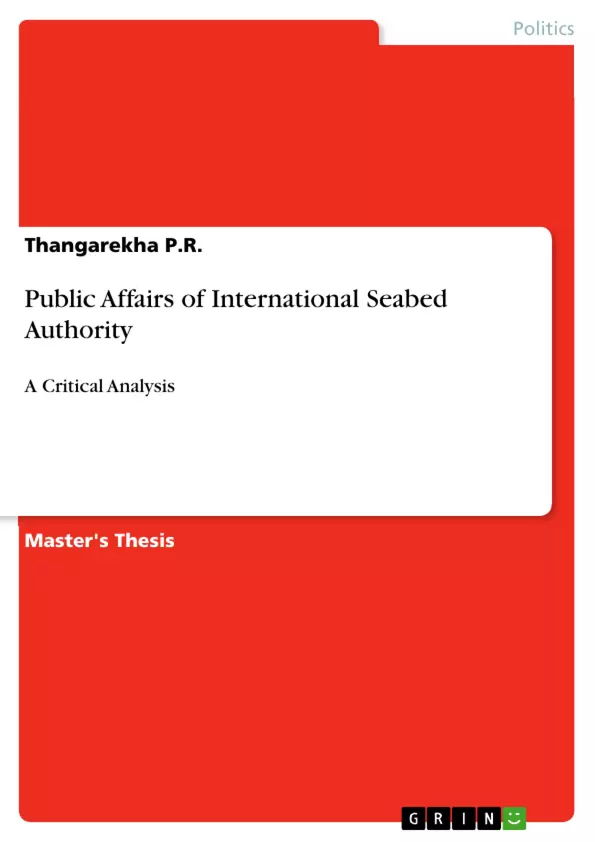The percentage of wealth contained beneath the high seas has become more and more apparent in recent years. Hence the technologically developed nations are interested to invest and exploit the resources in the high seas. Consequently it brings inequality in economic status among the international community. As a result, it poses sever problems to the developing countries and also to the landlocked or geographically disadvantaged states. To carry out the activities in the Area beyond national jurisdiction, for the benefit of mankind, the International Seabed Authority has established. The Authority performs number of public affairs activities for the benefit of developing states: regulates the activities in the seabed, ocean floor and subsoil thereof beyond the limits of national jurisdiction; and administers the resources of the Area. The ISA provides equitable sharing of benefits arise out of the Area among the states. Thereby it brings the equal progress in economic development among the member nations in the international seabed area, on the one hand; and protects the economic interest of the least developed, land-locked and geographically disadvantaged states, on the other. The research work analyses the public affairs of International Seabed Authority in securing the interest of the economically weaker and geographically disadvantaged states.
Inhaltsverzeichnis (Table of Contents)
- Introduction
- Brief Description
- Object and Scope
- Research Questions
- Hypotheses
- Research Methodology
- Chapterization
- Origin and Development of the International Seabed Authority
- Preliminary Consideration of UNCLOS 1982
- The Convention and Its Public Affairs
- History of International Seabed Authority
- Nature and Fundamental Principles of the Authority
- Organs of the Authority
- International Fund
- Legal Status, Privileges and Immunities
- International Public Affairs of the Authority
- Powers and Functions of International Seabed Authority
- Legal Regime of Exclusive Economic Zone
- Legal Regime of Continental Shelf
- Functions of ISA in the Exploitation of Continental Shelf
- Public Affairs of International Seabed Authority
- Economic Argument
- Shelf Entitlement for Landlocked States and Geographically Disadvantaged States
- Rights of the Landlocked States
- Rights of the Geographically Disadvantaged States
- Revenue Sharing in the Convention among the States
- LLGDS and Revenue Sharing
- ITLOS and Least Developed States and Landlocked States
- International Law of the Sea and Indian Maritime Legislation
- Maritime Boundaries of India
Zielsetzung und Themenschwerpunkte (Objectives and Key Themes)
This dissertation aims to provide a critical analysis of the public affairs of the International Seabed Authority (ISA). The study examines the origin and development of the ISA, its powers and functions, and the role it plays in managing the resources of the seabed.
- The role of the International Seabed Authority in managing the resources of the seabed
- The legal regime of the exclusive economic zone (EEZ) and the continental shelf
- The rights of landlocked and geographically disadvantaged states to access and benefit from seabed resources
- The distribution of revenue from seabed resources among states
- The relationship between the ISA and other international organizations, including the International Tribunal for the Law of the Sea (ITLOS)
Zusammenfassung der Kapitel (Chapter Summaries)
This dissertation is divided into four chapters. Chapter 1 provides an introduction to the research, outlining the research questions, hypotheses, and methodology. Chapter 2 explores the origin and development of the ISA, tracing its historical roots in the UNCLOS 1982. It examines the nature and fundamental principles of the Authority, its organs, and its legal status.
Chapter 3 delves into the powers and functions of the ISA, focusing on the legal regime governing the EEZ and the continental shelf. It analyzes the ISA's role in the exploitation of seabed resources within these areas. Chapter 4 examines the public affairs of the ISA, considering the economic arguments for and against the Authority's activities.
The chapter also explores the rights of landlocked and geographically disadvantaged states to access and benefit from seabed resources, and the distribution of revenue among states. Finally, it investigates the relationship between the ISA and other international organizations, including ITLOS.
Schlüsselwörter (Keywords)
The key terms and concepts explored in this dissertation include International Seabed Authority, UNCLOS 1982, public affairs, seabed resources, Exclusive Economic Zone (EEZ), continental shelf, landlocked states, geographically disadvantaged states, revenue sharing, International Tribunal for the Law of the Sea (ITLOS), and international law of the sea.
Frequently Asked Questions
What is the International Seabed Authority (ISA)?
The ISA is an international organization established to regulate activities in the seabed, ocean floor, and subsoil beyond the limits of national jurisdiction (the Area) for the benefit of mankind.
How does the ISA support developing and landlocked states?
The ISA ensures equitable sharing of benefits arising from seabed resources, protecting the economic interests of least developed, landlocked, and geographically disadvantaged states.
What is the legal basis for the ISA?
The ISA was established under the United Nations Convention on the Law of the Sea (UNCLOS) of 1982.
What is the difference between the EEZ and the Continental Shelf?
The Exclusive Economic Zone (EEZ) gives states rights over water and resources up to 200 nautical miles, while the Continental Shelf refers to the seabed extension where states have resource exploitation rights.
What role does revenue sharing play in UNCLOS?
UNCLOS provides a mechanism for sharing the financial and economic benefits derived from the exploitation of the Area among all member states, regardless of their geographical location.
What is the International Tribunal for the Law of the Sea (ITLOS)?
ITLOS is an independent judicial body that adjudicates disputes arising out of the interpretation and application of the UNCLOS convention.
- Quote paper
- Thangarekha P.R. (Author), 2015, Public Affairs of International Seabed Authority, Munich, GRIN Verlag, https://www.grin.com/document/426847



